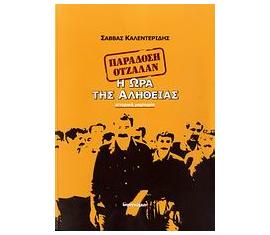If one takes an honest, even a somewhat hon-est, look at the Eastern Medterranean, and especially at the region which historically took the name of Asia Minor and Anatolia, one immediately gets the feeling that in this part of the world, history stopped some centuries ago. Here, that historical process -the great movement of peoples, which in Europe in the 19th and early 20th century led to the end of the empires, the end of the ancien regime, and to the creation of the contemporary nation-states -did not evolve naturally. Here, the demand of history and of the national bourgeois movements, like the Greek and the Armenian ones, for democratization of political institutions, for deep social and economic reforms, and for political autonomy and self-determination, was instead answered by the Ottoman establishment, the Young Turk and Kemalist movement, with the physical extermination and uprooting of the region's indigenous, but ethnically different, peoples.
The transition from empire to nation-state, and from feudalism to capitalism was undertaken by means of the biological, the physical, annihilation of the other nation and the other class. Asia Minor entered the 20th century with its first two genocides: The Armenian in 1915, and the Pontian in 1916-1923.
Ο Μιχάλης Χαραλαμπίδης γεννήθηκε στην Αλεξανδρούπολη το 1951. Σπούδασε πολιτικές-οικονομικές επιστήμες καθώς και μεταπτυχιακές σπουδές στην Κοινωνιολογία στο Πανεπιστήμιο της Ρώμης. Κατά τη διάρκεια της δικτατορίας διωκόμενος διέφυγε παράνομα στην Ιταλία. Συμμετείχε στην επταμελή ομάδα που συνέγραψε την ιδρυτική διακήρυξη του ΠΑΣΟΚ της 3ης του Σεπτέμβρη στο Μόναχο της Γερμανίας τον Αύγουστο του 1974. Ήταν μέλος της Κεντρικής Επιτροπής του ΠΑΣΟΚ από το 1977. Λόγω σοβαρών πολιτικών διαφωνιών αποχώρησε από το ΠΑΣΟΚ και ίδρυσε τη "Δημοκρατική Περιφερειακή Ένωση".
Είναι μέλος της Εκτελεστικής Επιτροπής της Διεθνούς Ένωσης για τα Δικαιώματα και την Απελευθέρωση των Λαών, διεθνούς μη κυβερνητικής οργάνωσης για τα ανθρώπινα δικαιώματα, αναγνωρισμένης από τον ΟΗΕ. Το 1994, το Ελληνικό Κοινοβούλιο υιοθέτησε την πρότασή του για την αναγνώριση της 19ης Μαΐου ως Ημέρα Μνήμης της Ποντιακής Γενοκτονίας. Έχει γράψει πολλά βιβλία καταθέτοντας την άποψή του γύρω από κοινωνικά και πολιτικά ζητήματα, όπως επίσης, γύρω απο την ιστορία, τον πολιτισμό, και τον πολιτικό αγώνα του ποντιακού λαού.
















